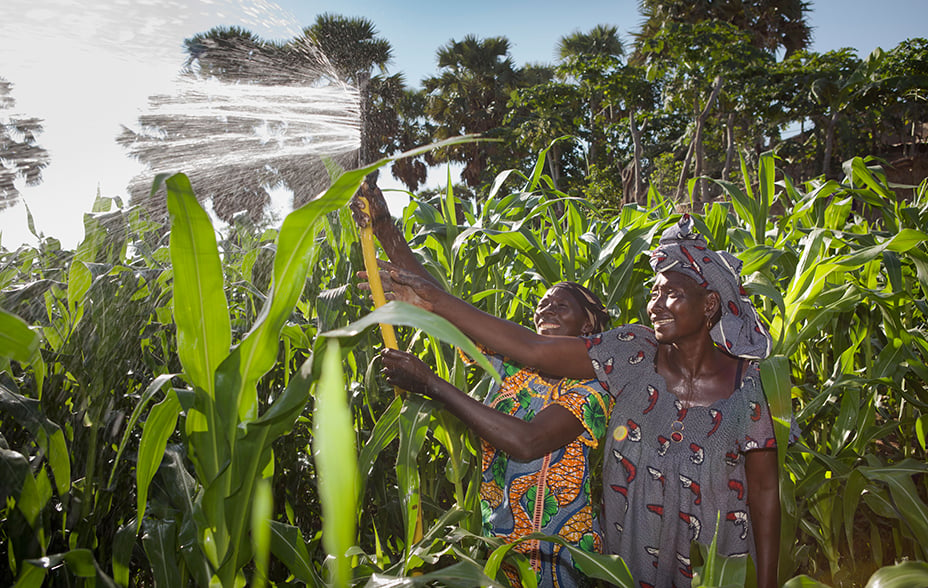
The value of an investment, and any income from it, can fall as well as rise and investors may not get back the amount invested.
Some of our investments have already had demonstrable impact. They include Moderna, the creator of the Spikevax Covid-19 vaccine, and Illumina, whose DNA-sequencing machines delivered the genetic code that made it possible. And the promise of their and others’ efforts to tackle cancer and a myriad of other ailments should alleviate much suffering in the decades to come.
We recognise, however, that our investment process must continually evolve. In particular, to think more deeply about how the concepts of impact and ESG (environmental, social and governance) come into play.
In July 2021, Maria Souza joined Baillie Gifford and our team as an impact and investment analyst. She came with 18 years of experience as an environmental scientist, senior biologist and project manager.
Her last role was at the United Nations Children’s Fund (UNICEF) in New York. Among many initiatives there she helped manage and monitor two Africa-focused HIV/AIDS projects and an internal effort to improve the organisation’s information management processes.
Prior to that, she was based in Brazil, where she evaluated the impact building hydropower and other energy facilities would have in the Amazon rainforest and proposed mitigating measures.
In the following short interview, we introduce the work Maria will be leading, aiming to expand the social and environmental impact of the companies in which we invest.

There is, clearly, a disconnect between what civil society and the investment management industry perceives as impact. How do you combine your experience and skills in impact projects with your new role in investments?
While my research over the past two decades centred on ecological microcosms, my findings were applicable to complex systems, generally. I have also applied scientific knowledge to study and mitigate human-made impact in the Brazilian Amazon rainforest. And for the past six years, I worked in both the Health, and the Water, Sanitation and Hygiene programmes at UNICEF. These varied experiences have one common element: the systems I was trying to study, protect and improve were highly complex. Interestingly, this doesn’t necessarily mean they were difficult to handle. I learned to embrace complexity with optimism and work with it (not against it and not despite it). One of the most exciting things about understanding a complex system is that it offers chances to find leverage points where exerting influence leads to disproportionate material results.
I think a complex system view on the cause and measurement of impact has significant utility in sustainability, ESG (environmental, social and governance) and impact investing. For example, for the Health Innovation strategy, it stands to reason that we care about contributing to resilient health systems at local, regional and global levels. Civil society also wants the same outcome. The time horizon required for this type of work does not lend itself to short-term metrics, nor can these goals be achieved through ‘box-ticking’ a simple ESG matrix. A resilient system is a complex property. And this approach may be the way to bridge what civil society and investors can perceive as impact. I believe that health sector investors and companies can build better synergies with governments, organisations and other stakeholders to advance the health agenda at all levels and help sustain the desired health outcomes that they have in common.
What are your thoughts on how impact work can influence investment returns?
Our new impact strategy is guided by the hypothesis that to increase the success of companies today and in the future, they need to improve their ability to effect greater positive impact in the world. Those that do, can increase their access to funding, keep loyal customers, increase their client base and attract gifted professionals, while also retaining them for longer periods. At Baillie Gifford, we are long-term investors. Understanding impact as a key driver for a company’s success therefore improves our understanding of the long-term investment case and our forward-looking theories for each company. Those driving material societal and environmental improvement, and therefore positive impact, will be the long-term winners.

What is the type of support you can offer to companies?
As a biologist, most of my career has been focused on developing frameworks to better assess and understand social and ecological impacts of human activity on the natural environment. There are many lessons nature teaches us about change in complex systems, but the ones I focus on are: effecting and sustaining change, disrupting or building resilience (depending on one’s aims), recognising catastrophic shifts and optimising knowledge transfer. Read that again in the context of analysing companies and you will see that these two worlds are not a million miles apart.
When one begins a career at the United Nations, the UN Charter calls on us to uphold the highest levels of efficiency, competence and integrity. This commitment is reflected in the Oath of Office taken when you become a UN staff member. I am captivated by the fact that I have been encouraged daily to keep the same UN principles while working as an analyst at Baillie Gifford.
Some anecdotal evidence? Since I have arrived at Baillie Gifford, I have shared and discussed a range of big ideas with my team, including: drugs; vaccines; diagnostics manufacture in Africa; global innovation syllabuses for children; work with universities and research centres in far-flung corners of the world; and my desire to help aid organisations work themselves out of business (as they are supposed to do) by investing in emerging markets. These concepts were not met with cynicism nor powerlessness. Instead, these ideas, and potential impact projects with companies, were met with interest, disposition and optimism, no matter how big they are, or how improbable they may seem at this time.
I look forward to developing these ideas further with my colleagues and working with companies to help structure projects for greater societal impact.
How will the investment process evolve now that you have joined the team?
I have a clear task at hand: to expand and develop the thinking about social and environmental impact as a direct result of the investment work of the Health Innovation strategy. I am leading the establishment of a new impact assessment framework which structures our long-term vision about impact and investing. As a result of this main task, a ‘Health Innovation Impact Strategy’ was discussed and then written. It is now under revision and will be published in the coming weeks. A baseline database about impact and ESG factors of the companies in the portfolio is also underway. These will be used to guide the work of existing companies in the portfolio, our communication with clients, and our alignment with like-minded investors.
With this work, we will also attempt to create value for the investment process, exploring ways to use impact to support the pre-investment phase, during sourcing of ideas, research and relationship building. We aim to strengthen the investment process using an interdisciplinary approach and via increased incorporation of sustainability factors. The core of this work was assessing the strategy’s ability to meet ‘Article 8’ classification under the Sustainable Finance Disclosure Regulation – SFDR (EU Regulation 2019/2088 of 27 November 2019). This was one of my first tasks within the team, to collaborate with colleagues in the alignment of the investment objective and investment policy of Health Innovation with the requirements of the SFDR. This was successfully achieved last month!
Critical to this evolution is an appropriate time horizon. ESG problems are not easily solved, and so anyone focused on the next 12 months might have little scope to consider them. Health Innovation’s focus is on the next five to ten years (and beyond), so the companies in which we invest must be acutely aware of these problems and be willing to work to address them. Often, we see companies beginning to consider ESG factors only after IPO or after a certain maturity level. Health Innovation aims to invest in companies that have the potential to bring substantial (not incremental) improvements to human health and healthcare systems. To achieve these goals, we think it is key that their ESG and impact work start as early as possible.
Once we have identified the companies that we think meet these criteria, the next question is ‘how can we help’? We are supportive shareholders, focused on the long-term potential of companies. It is therefore our duty to support them on this journey.
Our understanding of impact will allow us to be better investors. This could be valuable for strengthening our relationships with companies and helping them to improve their businesses. As everyone is trying to navigate the sustainability landscape, companies might be very appreciative of that. On that front, we are already doing well on the governance side, and it is all about broadening the scope. That is what we have set out to do, now. I am looking forward to seeing these hopes being turned into reality – and setting the standard for responsible socially-minded investing going forward.
Risk factors
The views expressed in this communication are those of the Health Innovation Team and should not be considered as advice or a recommendation to buy, sell or hold a particular investment. They reflect personal opinion and should not be taken as statements of fact nor should any reliance be placed on them when making investment decisions.
This communication was produced and approved in January 2022 and has not been updated subsequently. It represents views held at the time of writing and may not reflect current thinking.
Potential for profit and loss
All investment strategies have the potential for profit and loss, capital is at risk. Past performance is not a guide to future returns.
Stock examples
Any stock examples and images used in this communication are not intended to represent recommendations to buy or sell, neither is it implied that they will prove profitable in the future. It is not known whether they will feature in any future portfolio produced by us. Any individual examples will represent only a small part of the overall portfolio and are inserted purely to help illustrate our investment style.
This communication contains information on investments which does not constitute independent research. Accordingly, it is not subject to the protections afforded to independent research, but is classified as advertising under Art 68 of the Financial Services Act (‘FinSA’) and Baillie Gifford and its staff may have dealt in the investments concerned.
All information is sourced from Baillie Gifford & Co and is current unless otherwise stated.
The images used in this communication are for illustrative purposes only.
Important information
Baillie Gifford & Co and Baillie Gifford & Co Limited are authorised and regulated by the Financial Conduct Authority (FCA). Baillie Gifford & Co Limited is an Authorised Corporate Director of OEICs.
Baillie Gifford Overseas Limited provides investment management and advisory services to non-UK Professional/Institutional clients only. Baillie Gifford Overseas Limited is wholly owned by Baillie Gifford & Co. Baillie Gifford & Co and Baillie Gifford Overseas Limited are authorised and regulated by the FCA in the UK.
Persons resident or domiciled outside the UK should consult with their professional advisers as to whether they require any governmental or other consents in order to enable them to invest, and with their tax advisers for advice relevant to their own particular circumstances.
Financial intermediaries
This communication is suitable for use of financial intermediaries. Financial intermediaries are solely responsible for any further distribution and Baillie Gifford takes no responsibility for the reliance on this document by any other person who did not receive this document directly from Baillie Gifford.
Europe
Baillie Gifford Investment Management (Europe) Limited provides investment management and advisory services to European (excluding UK) clients. It was incorporated in Ireland in May 2018 and is authorised by the Central Bank of Ireland. Through its MiFID passport, it has established Baillie Gifford Investment Management (Europe) Limited (Frankfurt Branch) to market its investment management and advisory services and distribute Baillie Gifford Worldwide Funds plc in Germany. Similarly, it has established Baillie Gifford Investment Management (Europe) Limited (Amsterdam Branch) to market its investment management and advisory services and distribute Baillie Gifford Worldwide Funds plc in The Netherlands. Baillie Gifford Investment Management (Europe) Limited also has a representative office in Zurich, Switzerland pursuant to Art. 58 of the Federal Act on Financial Institutions (‘FinIA’). It does not constitute a branch and therefore does not have authority to commit Baillie Gifford Investment Management (Europe) Limited. It is the intention to ask for the authorisation by the Swiss Financial Market Supervisory Authority (FINMA) to maintain this representative office of a foreign asset manager of collective assets in Switzerland pursuant to the applicable transitional provisions of FinIA. Baillie Gifford Investment Management (Europe) Limited is a wholly owned subsidiary of Baillie Gifford Overseas Limited, which is wholly owned by Baillie Gifford & Co.
Hong Kong
Baillie Gifford Asia (Hong Kong) Limited 柏基亞洲(香港)有限公司 is wholly owned by Baillie Gifford Overseas Limited and holds a Type 1 and a Type 2 license from the Securities & Futures Commission of Hong Kong to market and distribute Baillie Gifford’s range of collective investment schemes to professional investors in Hong Kong. Baillie Gifford Asia (Hong Kong) Limited 柏基亞洲(香港)有限公司 can be contacted at Suites 2713–2715, Two International Finance Centre, 8 Finance Street, Central, Hong Kong. Telephone +852 3756 5700.
South Korea
Baillie Gifford Overseas Limited is licensed with the Financial Services Commission in South Korea as a cross border Discretionary Investment Manager and Non-discretionary Investment Adviser.
Japan
Mitsubishi UFJ Baillie Gifford Asset Management Limited (‘MUBGAM’) is a joint venture company between Mitsubishi UFJ Trust & Banking Corporation and Baillie Gifford Overseas Limited. MUBGAM is authorised and regulated by the Financial Conduct Authority.
Australia
Baillie Gifford Overseas Limited (ARBN 118 567 178) is registered as a foreign company under the Corporations Act 2001 (Cth) and holds Foreign Australian Financial Services Licence No 528911. This material is provided to you on the basis that you are a ‘wholesale client’ within the meaning of section 761G of the Corporations Act 2001 (Cth) (‘Corporations Act’). Please advise Baillie Gifford Overseas Limited immediately if you are not a wholesale client. In no circumstances may this material be made available to a ‘retail client’ within the meaning of section 761G of the Corporations Act.
This material contains general information only. It does not take into account any person’s objectives, financial situation or needs.
South Africa
Baillie Gifford Overseas Limited is registered as a Foreign Financial Services Provider with the Financial Sector Conduct Authority in South Africa.
North America
Baillie Gifford International LLC is wholly owned by Baillie Gifford Overseas Limited; it was formed in Delaware in 2005 and is registered with the SEC. It is the legal entity through which Baillie Gifford Overseas Limited provides client service and marketing functions in North America. Baillie Gifford Overseas Limited is registered with the SEC in the United States of America.
The Manager is not resident in Canada, its head office and principal place of business is in Edinburgh, Scotland. Baillie Gifford Overseas Limited is regulated in Canada as a portfolio manager and exempt market dealer with the Ontario Securities Commission ('OSC'). Its portfolio manager licence is currently passported into Alberta, Quebec, Saskatchewan, Manitoba and Newfoundland & Labrador whereas the exempt market dealer licence is passported across all Canadian provinces and territories. Baillie Gifford International LLC is regulated by the OSC as an exempt market and its licence is passported across all Canadian provinces and territories. Baillie Gifford Investment Management (Europe) Limited (‘BGE’) relies on the International Investment Fund Manager Exemption in the provinces of Ontario and Quebec.
Oman
Baillie Gifford Overseas Limited (‘BGO’) neither has a registered business presence nor a representative office in Oman and does not undertake banking business or provide financial services in Oman. Consequently, BGO is not regulated by either the Central Bank of Oman or Oman’s Capital Market Authority. No authorization, licence or approval has been received from the Capital Market Authority of Oman or any other regulatory authority in Oman, to provide such advice or service within Oman. BGO does not solicit business in Oman and does not market, offer, sell or distribute any financial or investment products or services in Oman and no subscription to any securities, products or financial services may or will be consummated within Oman. The recipient of this material represents that it is a financial institution or a sophisticated investor (as described in Article 139 of the Executive Regulations of the Capital Market Law) and that its officers/employees have such experience in business and financial matters that they are capable of evaluating the merits and risks of investments.
Qatar
The materials contained herein are not intended to constitute an offer or provision of investment management, investment and advisory services or other financial services under the laws of Qatar. The services have not been and will not be authorised by the Qatar Financial Markets Authority, the Qatar Financial Centre Regulatory Authority or the Qatar Central Bank in accordance with their regulations or any other regulations in Qatar.
Israel
Baillie Gifford Overseas is not licensed under Israel’s Regulation of Investment Advising, Investment Marketing and Portfolio Management Law, 5755–1995 (the Advice Law) and does not carry insurance pursuant to the Advice Law. This material is only intended for those categories of Israeli residents who are qualified clients listed on the First Addendum to the Advice Law.
Ref: 14300 10006334




